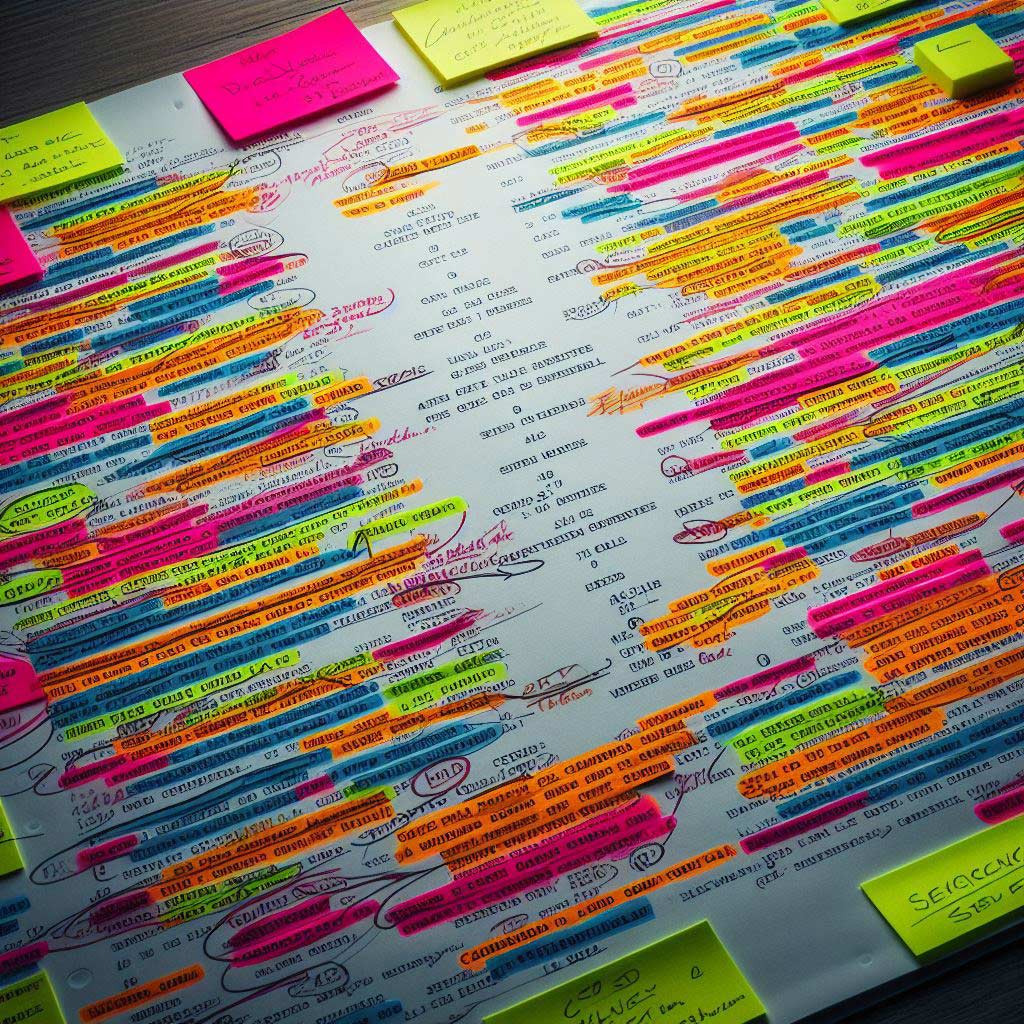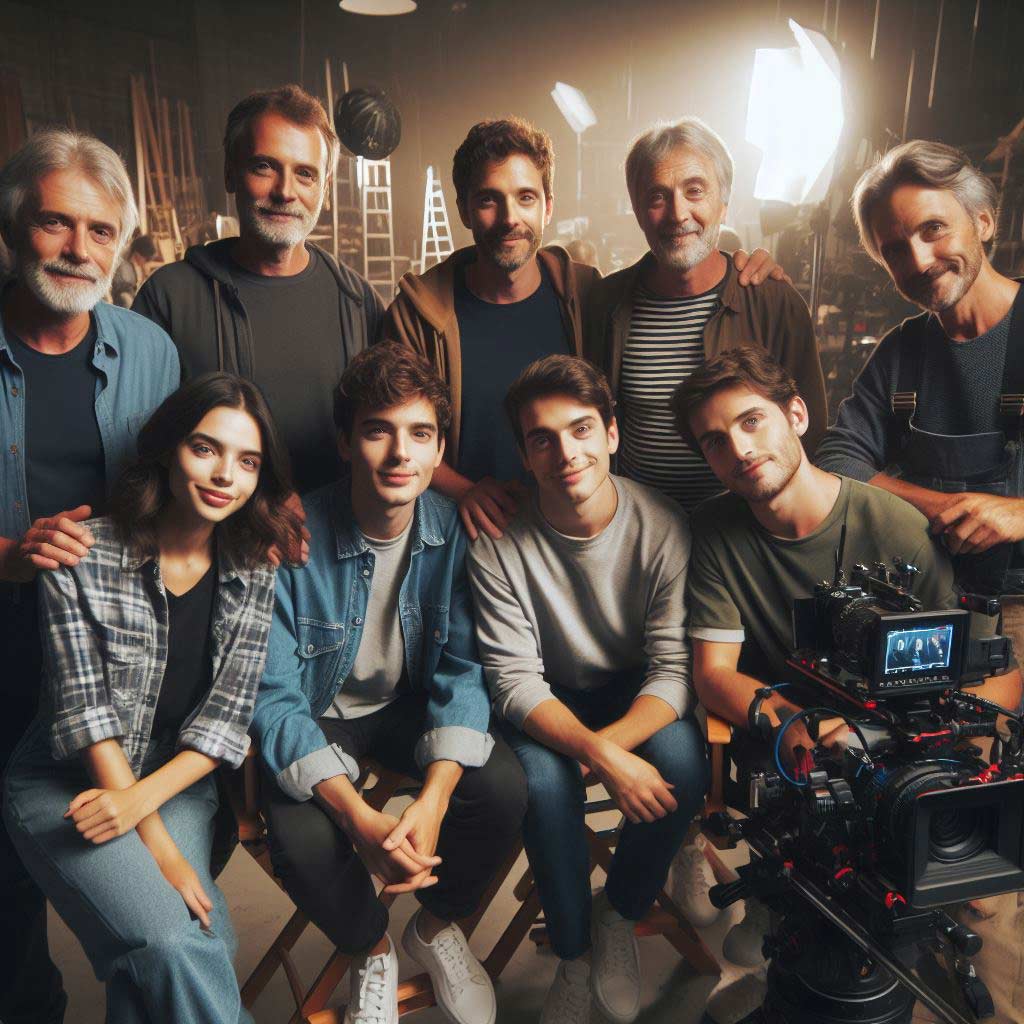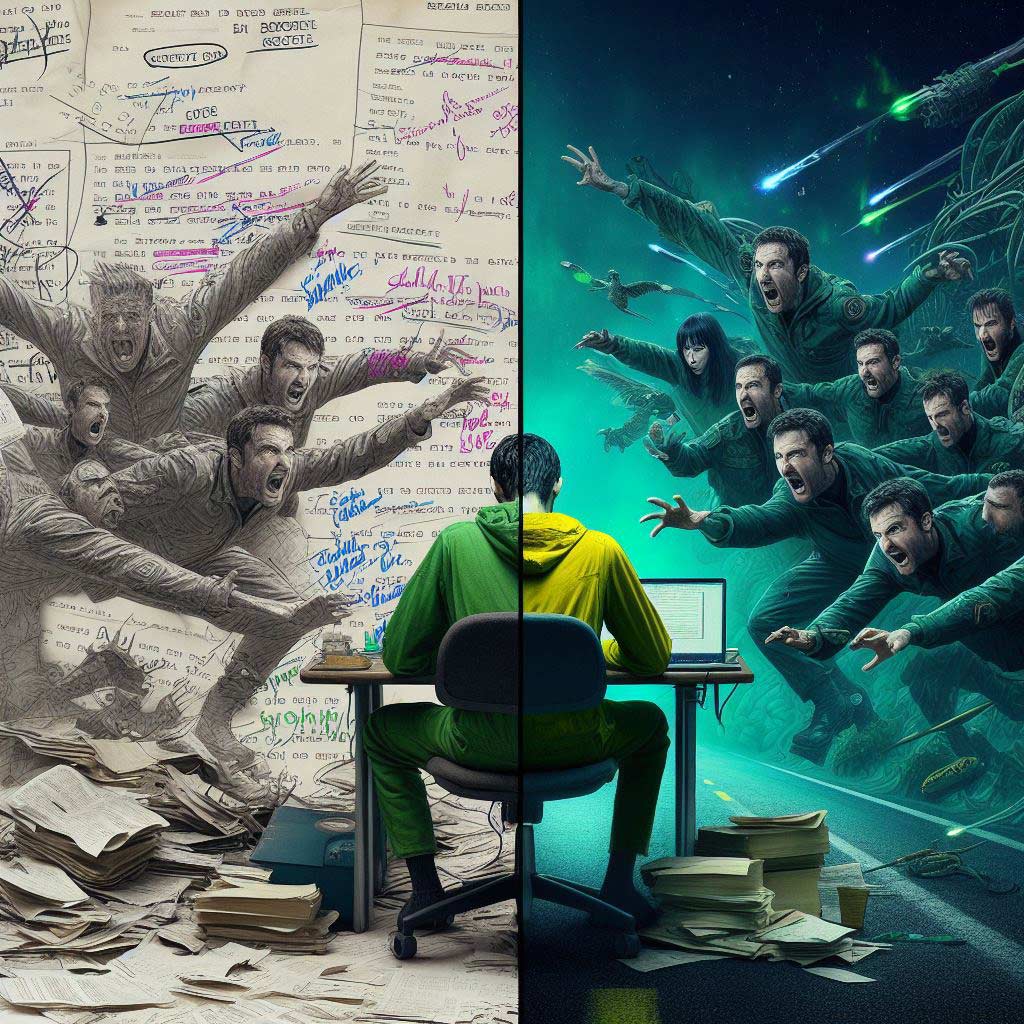If you’ve ever wondered who the person holding a notepad and scrutinizing every scene on a movie set is, chances are that’s the script supervisor.
Script supervisors, also sometimes referred to as continuity supervisors, play a crucial role in ensuring continuity and consistency throughout a film production.
Often sitting beside the director, script supervisors have an eagle-eyed focus on minute details within each shot and scene. They meticulously take notes during filming, log technical aspects, and compile important reports. While it may seem tedious to some, the role of a script supervisor provides the continuity glue that holds a film production together.
Keep reading this extensive guide to find out exactly what a script supervisor does, why they are so vital, the skills involved, their interactions with other crew members, typical day-to-day responsibilities, and more insights to understand this unique and demanding filmmaking role.
What Is a Script Supervisor?
A script supervisor oversees the continuity and consistency of a film production. Seated beside the director, they closely monitor shooting and take detailed notes on dialogue and action in each scene and make sure there is continuity between shots that will be edited together later.
Script supervisors are responsible for catching any inconsistencies and bringing them to the director’s attention before the scene progresses further.
This saves a lot of headaches down the line in post-production when trying to edit together a coherent sequence. They also compile continuity reports and oversee logging props, wardrobe, technical specs, and more to provide a reference record for the production crew and editors.
In summary, a script supervisor keeps track of all the minute but crucial details required to make sure all scenes match when they are eventually edited together into the final version. Without the hawk-eyed focus and organizational skills of great script supervisors, films would have much more visible flaws and continuity errors.
Script Supervisor Responsibilities and Duties
Script supervisors have a broad range of essential responsibilities and duties during film production including:
- Taking detailed notes on dialogue and action – Script supervisors sit beside the director and record what dialogue is used and how it corresponds to the shooting script. This includes the notation of any ad-libs or changes. They also note any action occurring in the scene outside of dialogue – crucial references for editing later.

- Logging scene and take numbers – Detailed scene and take info is noted so shots can be easily located in editing. Script supervisors will log not just the scene and take number, but also the camera type used and camera angles within the take.
- Capturing technical specs – Other technical notes might include lens sizes, exposures, sound speeds, dates, and any other relevant technical considerations that took place during the shoot.
- Continuity details – Key props, wardrobe/costuming, makeup, set changes, and more are all documented by script supervisors to catch any continuity issues. Even small details like a glass level or the position of a chair get recorded so the set can be reconstructed if reshoots are required.
- Matching action and dialogue – One of the key script supervisor duties happens once a scene has finished filming when they announce if the editors have a “match” meaning the dialogue and action align across the usable takes. If not, reshoots may be required.
- Compiling daily progress reports – Each day’s logged shooting progress gets summarized in daily production reports. This helps the assistant director and unit production manager stay organized.
- Supporting the editor – The script supervisor’s copious notes provide invaluable insight to the film editor once post-production begins by detailing the director’s preferred takes and technical aspects of what footage exists for constructing coherent scenes and sequences.
This list summarizes the main responsibilities, however, script supervisors often take on a range of odd jobs required to support a production including making copies, arranging crowd shots, attending emergency meetings, and anything else vital to keeping filming running smoothly without continuity issues.
Important Skills and Qualities
Succeeding in such a fast-paced, detail-heavy, and critical filmmaking role requires some crucial skills and personal abilities:
- Excellent organizational habits – Copious amounts of paperwork, logging, and reporting means script supervisors need to be meticulous with cataloging every scene detail as shooting progresses. Missing one detail could lead to serious post-production issues.
- Attention to detail – A good script supervisor has an eagle-eye focus even when chaos reigns on busy sets. Subtle differences from take to take can’t escape their scrutiny.
- Multitasking abilities – They need to juggle several tasks at once while still closely following the action on screen with full concentration. Taking notes while scrutinizing scenes with full detail is standard.
- Collaborative – Liaising with directors, producers, writers, actors, and many other departments is part of the job. Being able to communicate tactfully ensures issues get addressed promptly.
- Extensive filmmaking knowledge – Understanding editing workflows and post-production stages allows script supervisors to provide solutions to problems on set and gather the appropriate reference info needed in editing.
- Problem-solving skills – Hiccups happen frequently whether it’s props being mislaid, shooting falling behind, or last-minute script changes. Script supervisors need the adaptability to develop quick solutions while still upholding continuity compliance.
In many ways, script supervisors need to collaborate intensely with the director on continuity while still having the confidence to speak up when issues could impact editing workflows further down the line. The role fuses immense creativity with technical mastery – a rare combination of talents.
Daily Responsibilities and Workflow in Depth
While every production brings its challenges, script supervisors tend to follow a typical routine on filming days:
Prep Work
Script supervisors begin each shoot day well in advance of when the cameras start rolling. They arrive early to collate shooting scripts, begin their script breakdowns, check schedules, and touch base with the assistant director on the day’s plans. Prep work ensures shooting stays efficient once the director calls the action.
On Set Duties
Once the shooting starts, script supervisors kick their skills into high gear:
- Sit beside the director to follow shot framing and action
- Take copious notes on dialogue and movement
- Log technical specs like scene, shot, take, angles
- Record camera lens, sound speeds, and lighting changes
- Track all continuity details (props, wardrobe, etc)
- Monitor that dialogue matches from take to take
Double Checks
After each take, Script supervisors double-check notes, and validate key details with camera crews and other departments before announcing whether usable footage was captured before proceeding to the next setup.

Liaison
Script supervisors also serve as vital liaisons between various production departments to uphold continuity compliance. This means interacting extensively with makeup, costumes, props, and sets daily. When issues emerge, they troubleshoot solutions.
Wrap Up
At the end of each shoot day, supervisors must complete progress reports summarizing the completed footage with details that will prove invaluable to the editing process later on. They follow up on any continuity issues, back up notes, and prepare reporting vital for the next day’s shooting schedule.
Post Production Duties
The task does not end for script supervisors once principal photography wraps. They continue assisting editors in the post-production stage by advising which works best for constructing scenes. Their detailed notes taken during production provide editors with immense insight. They may also write up final continuity reports for archiving once the film is completed.
Relationships With Other Production Crew
Script supervisors collaborate with most departments at various stages, but have particularly close working dynamics with:
- Directors – Supervisors sit beside directors so they can understand desired framing, shooting progress, and creative goals. This allows them to pinpoint the takes that best fulfill the director’s vision for editing purposes while still upholding continuity compliance. Open communication ensures potential editing issues get addressed promptly.

- Camera Crews – Script supervisors heavily rely on camera crews for exact specs like scene, shot, take numbers, lenses, etc. They collaborate so technical logs are complete. Camera crews also assist in verifying if usable footage was captured by reviewing tape/digital footage on monitors.
- Actors – While focusing mainly on the footage itself, script supervisors also observe actor performances closely for continuity – especially about props and wardrobe. Briefings with actors ensure everyone understands continuity requirements before shooting commences.
- Costume Department – Script supervisors take extensive notes on costumes and enlist costume help if establishing shots reveals discontinuities in actor wardrobe/accessories that jeopardize editing potential. Costume departments rely on supervisor notes during production and after if clothing requires reproduction.
- Producers/Writers – Script supervisors assist producers and writers with reworking dialogue, script changes, and modifying scenes when continuity conflicts emerge. They also clarify creative intentions. Supervisor reports give insights on shooting progress.
Tips For Aspiring Script Supervisors
For those interested in embarking on a career as a script supervisor, here are some handy tips:
- Read numerous scripts to understand the required formats inside out. Having an innate sense of script rhythm helps enormously.
- Consider attending film school and pay special attention to editing and post-production courses to build vital knowledge regarding how footage translates to finished products.
- Getting a foot in the door often happens via entry-level production assistant jobs. Be willing to take on even mundane tasks with a positive spirit. Learning set dynamics is invaluable.

- Master organizational skills by researching proven Hollywood continuity tracking methods. Testing systems with sample scripts helps polish note-taking abilities.
- The willingness to learn quickly, ask questions, and receive feedback without ego is crucial. Film sets often involve high-pressure troubleshooting.
- Prepare to work extremely long hours with intense concentration. Stamina to stay focused when other departments relax between shots also helps considerably.
Conclusion
Script supervisors play an undervalued but incredibly vital role in filmmaking. Keeping track of the minute details that most take for granted requires a rare skill set combining intense organizational abilities, unwavering concentration, production knowledge, and creative awareness.
The next time you watch the full credits roll at the end of a movie, remember the script supervisor who painstakingly ensured a flawless editing process behind the scenes.
Their efforts to coordinate continuity allow directors, editors, actors, and other departments to do quality work. Without them, the filmmaking workflow would have far more disconnects.

Hopefully, this extensive guide has provided plenty of insights explaining exactly what a script supervisor does, why they are so invaluable, and what skills great continuity oversight demands.
So for an inside look at this little-known but heroic film crew role, be sure to watch the script supervisor in action on your next film or TV production set visit!
Frequently Asked Questions
What does the script supervisor do?
A script supervisor oversees continuity and consistency throughout a production. They take detailed notes on dialogue, action, wardrobe, props, technical specs, and more to make sure shots match when edited together.
How much do script supervisors earn?
In the US, script supervisors earn an average of $55,000 annually early in their careers based on union rates. Those with considerable experience in bigger budget productions can earn $75,000 to $100,000+ per year.
Who works under the script supervisor?
No other roles work under script supervisors. However, they collaborate very closely with directors providing key details to editors in post-production and providing progress reports to producers/writers.
How do I train to be a script supervisor?
Getting a film production degree or training in continuity software helps. But most training happens through production assistant jobs learning in assistant roles before specializing. Continuity seminars and classes also provide knowledge before applying for supervisor jobs.
How do I get a script supervisor job?
Gaining experience as a set production assistant first allows opportunities to learn. As skills in continuity tracking grow, speak to the script supervisor about assisting. After training under them look for junior script supervisor job listings from film/TV networks.
Are script supervisors in demand?
Yes. The level of detail needed for continuity in modern filmmaking relies heavily on skilled script supervisors even with more productions happening. Their organizational skills are in demand as media output expands.
What is the life of a script supervisor?
Script supervisors work long 12+ hour days throughout production. Shooting schedules means working weekends and holidays frequently. It’s fast-paced with high-pressure troubleshooting issues as they arise to prevent expensive reshoots. Meticulous note-taking is required through all conditions.
What is the difference between a script supervisor and an assistant director?
Assistant directors oversee the daily execution of filming schedules and set operations. Script supervisors specialized in oversight of continuity and content accuracy, taking notes for editing purposes rather than overall logistics. Their roles work closely to make productions run smoothly.


